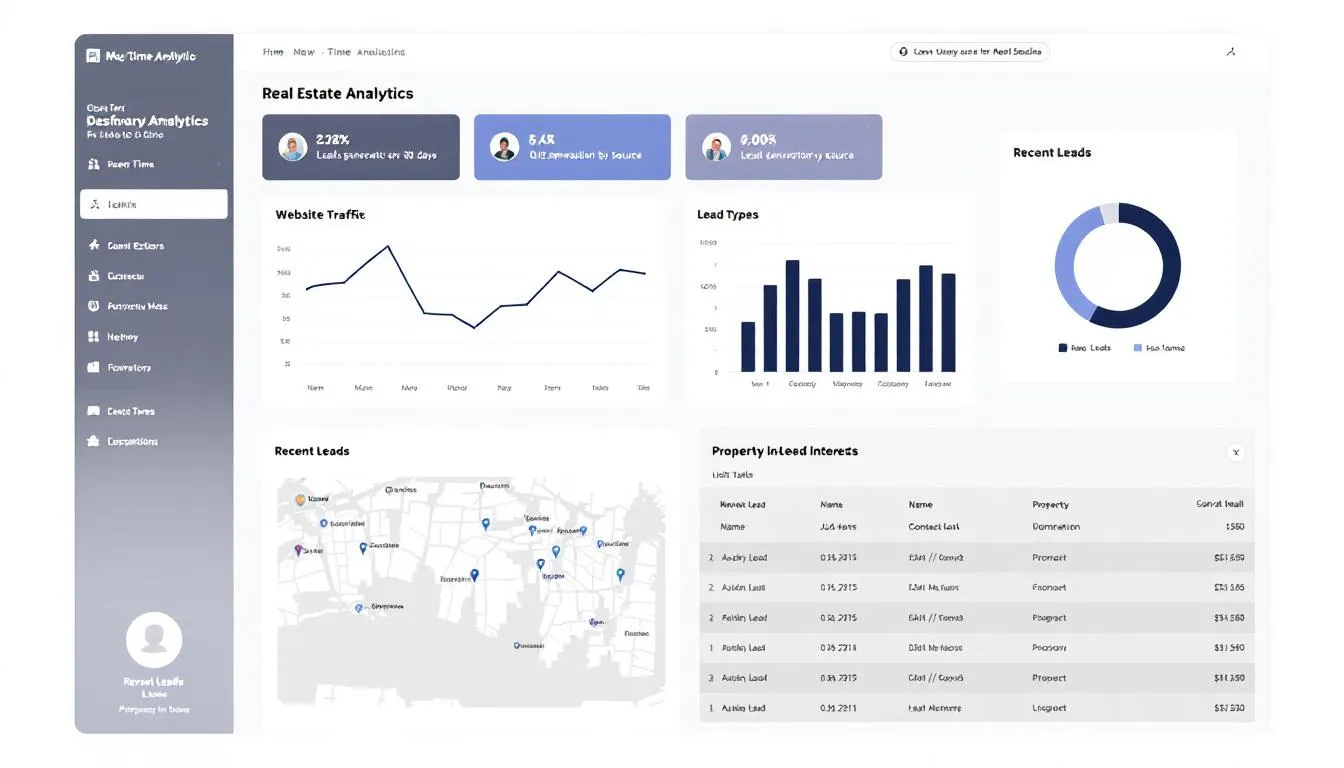
Digital Marketing for Real Estate: Complete Guide to Growing Your Property Business Online
Key Takeaways
Real estate digital marketing combines SEO, social media, content marketing, and paid advertising to generate qualified leads and increase property sales
97% of homebuyers start their property search online, making digital presence essential for real estate professionals in 2024
Video marketing and virtual tours can increase real estate income by up to 49% while building trust with potential buyers. Video content is expected to account for the majority of all web traffic by 2023, emphasizing its importance in digital strategies.
Mobile-optimized websites and local SEO are critical since 77% of property searches happen on mobile devices
Marketing automation and CRM integration help real estate agents nurture leads through long sales cycles effectively
The real estate industry has undergone a digital revolution that fundamentally changed how properties are marketed, discovered, and sold. When 97% of homebuyers start their property search online, real estate professionals can no longer rely solely on traditional marketing methods like print advertising and yard signs.
Modern real estate businesses must embrace digital marketing strategies to remain competitive in today’s market. From search engine optimization to virtual tours, social media advertising to email marketing automation, successful real estate agents are leveraging technology to attract more qualified leads, showcase properties effectively, and close deals faster than ever before. Digital marketing requires specialist strategies and execution tailored to the real estate sector to ensure maximum impact.
This comprehensive guide will walk you through every aspect of digital marketing for real estate, providing actionable strategies that can transform your property business and help you thrive in the digital age.

What is Digital Marketing for Real Estate?
Real estate digital marketing encompasses the strategic use of online channels, technologies, and tactics to promote properties, generate leads, build brand awareness, and engage with potential buyers or sellers through digital platforms. Unlike traditional real estate marketing that relied heavily on newspaper ads, billboards, and physical signage, digital marketing leverages the internet’s reach and targeting capabilities to connect with interested buyers where they spend most of their time - online. Online marketing, which includes these digital strategies, is essential for real estate professionals to enhance visibility, attract leads, and improve client engagement. Publishing high-quality, informative content such as blog posts, e-books, or guides is a key strategy to build credibility and attract organic traffic.
The core components of real estate digital marketing include search engine optimization and search engine optimisation to improve online visibility and generate more organic traffic, content marketing to establish expertise and trust, social media marketing to engage communities, email marketing for lead nurturing, and paid advertising for immediate reach. These digital marketing strategies work together to create a comprehensive online presence that attracts potential clients throughout their property journey.
What sets real estate digital marketing apart from traditional methods is its measurability and precision. While a newspaper ad reaches everyone in a geographic area regardless of their interest in buying property, digital ads can target specific demographics, interests, and behaviors. This targeted approach not only reduces marketing costs but also increases the likelihood of connecting with serious buyers and sellers. Digital marketing strategies are specifically designed to attract clients and real estate clients, ensuring your efforts reach those most likely to engage.
The digital marketing approach for real estate businesses also enables 24/7 availability. Potential buyers, including prospective buyers, can view property listings, take virtual tours, and submit inquiries at any time, making the buying process more convenient and accessible. This always-on availability has become essential as consumer behavior has shifted dramatically toward online research and decision-making.
Modern real estate digital marketing integrates multiple channels into a cohesive strategy. A successful digital marketing plan might include a mobile-optimized website with property search functionality, active social media profiles showcasing listings and market expertise, regular email newsletters with market updates, and targeted Google ads for specific neighborhoods or property types.
Why Real Estate Professionals Need Digital Marketing in 2024
The statistics surrounding online property searches paint a clear picture of why digital marketing has become essential for real estate success. According to the National Association of Realtors, 98% of buyers search online during their home buying process, with 51% finding their homes through internet searches. These numbers represent a fundamental shift in consumer behavior that real estate professionals cannot ignore.
The average homebuyer now views 10 properties online before scheduling their first in-person visit. This means real estate agents have mere seconds to capture attention and make a compelling first impression through their digital presence. Properties with high-quality photos, virtual tours, and comprehensive online information receive significantly more inquiries than those with minimal digital marketing efforts. Integrating virtual tour software to offer immersive 3D property tours, such as those created with Matterport, can save time and attract out-of-town buyers, enhancing the overall experience.
Digital marketing offers real estate businesses a competitive advantage in increasingly crowded markets. While traditional marketing methods reach broad audiences with limited targeting, digital strategies allow precise targeting of potential buyers based on their location, age, income level, and property interests. This precision reduces marketing waste and improves return on investment significantly.
Cost-effectiveness represents another compelling reason for embracing digital marketing. Traditional real estate advertising in newspapers or magazines can cost thousands of dollars with limited ability to track results. In contrast, digital marketing campaigns can start with modest budgets and provide detailed analytics showing exactly which strategies generate leads and sales.
The ability to track and measure marketing effectiveness sets digital strategies apart from traditional methods. Real estate professionals can monitor website traffic, lead generation, real estate leads, lead conversion rates, email open rates, and social media engagement in real-time. Monitoring real estate leads and lead conversion rates is essential to evaluate the success of marketing efforts. This data enables continuous optimization of marketing efforts, ensuring maximum return on marketing investment. Using analytics to adjust strategies helps improve performance and stay aligned with evolving market trends.
Customer expectations have also evolved dramatically. Today’s property buyers expect to find comprehensive information online, including high-resolution photos, virtual tours, neighborhood details, and market data. Real estate agents who cannot meet these digital expectations risk losing potential clients to competitors who provide superior online experiences.
Essential Digital Marketing Strategies for Real Estate
Search Engine Optimization (SEO) for Real Estate
Search engine optimization forms the foundation of successful real estate digital marketing by ensuring your website and listings appear prominently when potential clients search for properties or real estate services. Local SEO is particularly crucial for real estate businesses since most property searches include location-specific terms like “homes for sale in [city]” or “real estate agent near me.”
Effective real estate SEO begins with comprehensive keyword research to identify the terms your target audience uses when searching for properties. These keywords should include specific neighborhoods, property types, price ranges, and real estate services. For example, a real estate agent in Miami might target keywords like “luxury condos South Beach,” “first-time homebuyer programs Miami,” or “Miami real estate market trends.”
On-page SEO optimization involves structuring your real estate website to help search engines understand and rank your content effectively. This includes optimizing property listing pages with descriptive titles, detailed descriptions using relevant keywords, and proper heading structure. Each property listing should include location-specific information, neighborhood details, and amenities that potential buyers might search for.
Google My Business optimization is essential for local SEO success in real estate. Your Google My Business profile should include accurate contact information, business hours, high-quality photos of your office and team, and regular posts about new listings or market updates. Encouraging satisfied clients to leave positive reviews on your Google My Business profile significantly improves your local search rankings.
Content SEO involves creating valuable blog content that positions you as a local market expert while targeting relevant keywords. Effective content topics include neighborhood guides, market trend analyses, first-time homebuyer advice, and investment property insights. Publish blog posts and guides focusing on specific neighborhoods, local amenities, market trends, and community events to establish local authority. This content not only improves search rankings but also demonstrates your expertise to potential clients.
Technical SEO considerations for real estate websites include ensuring fast page load speeds, mobile responsiveness, and proper site structure. Since many property searches happen on mobile devices, your website must provide an excellent user experience across all devices. Professional real estate website design is essential for both user experience and search engine optimisation, as it helps showcase properties effectively, integrates with property platforms, and strengthens your brand. Additionally, implementing schema markup for property listings helps search engines display rich snippets with property details directly in search results.
Content Marketing for Real Estate Professionals
Content marketing establishes real estate professionals as trusted authorities in their local markets while providing valuable information that attracts potential buyers and sellers. Successful real estate content marketing goes beyond simple property listings to offer insights, education, and guidance throughout the buying or selling process.
Market reports and trend analyses represent powerful content marketing tools for real estate agents. Monthly or quarterly reports highlighting local market conditions, price trends, and inventory levels position agents as knowledgeable experts while providing valuable information to potential clients. These reports can be distributed through email newsletters, social media, and website blogs to maintain regular contact with your audience.
Neighborhood guides offer another excellent content marketing opportunity. Comprehensive guides covering local schools, restaurants, shopping, transportation, and community events help potential buyers understand what it’s like to live in specific areas. These guides also perform well in local search results, attracting people researching potential neighborhoods online.
Educational content addressing common real estate questions builds trust and demonstrates expertise. Blog posts covering topics like “How to Prepare Your Home for Sale,” “Understanding Mortgage Pre-Approval,” or “First-Time Homebuyer Mistakes to Avoid” provide value while showcasing your knowledge and professionalism.
Creating a content calendar ensures consistent publishing and helps maintain audience engagement. Plan content around seasonal trends, local events, and market cycles. For example, spring content might focus on preparing homes for sale, while winter content could emphasize holiday home staging or year-end market summaries.
Repurposing content across multiple platforms maximizes your marketing efforts. A comprehensive market report can be transformed into social media posts, email newsletter content, video presentations, and downloadable resources. This approach ensures your valuable content reaches audiences across different channels and preferences.
Social Media Marketing for Real Estate
Social media platforms provide real estate professionals with powerful tools for showcasing properties, building relationships, and generating leads. Each platform offers unique advantages for real estate marketing, requiring tailored strategies to maximize effectiveness.
Facebook remains the most popular platform for real estate marketing due to its robust advertising capabilities and diverse user base. Real estate agents can create business pages to share listings, market updates, and community information. Facebook Groups focused on local neighborhoods or real estate topics help build engaged communities around your expertise.
Instagram’s visual nature makes it perfect for showcasing beautiful properties and behind-the-scenes content. High-quality photos and videos of listings, virtual staging examples, and agent lifestyle content perform well on Instagram. Instagram Stories and Reels offer opportunities for more casual, authentic content that builds personal connections with potential clients. Utilizing Instagram Stories for a candid look at your work and running live Q&A sessions on social media can further engage your audience and foster trust.
LinkedIn serves as the professional network for real estate, particularly valuable for commercial real estate and luxury residential markets. Real estate professionals can share market insights, industry news, and thought leadership content to establish credibility within professional networks.
Content strategies for social media should balance promotional and educational content. While showcasing new listings is important, successful real estate social media marketing also includes market tips, community highlights, client testimonials, and personal insights that build relationships and trust. Social media management is essential for scheduling posts, engaging with your audience, and tracking campaign performance to ensure your content strategy is effective.
Social media advertising enables precise targeting of potential buyers and sellers. Facebook and Instagram ads can target users based on location, age, income level, interests, and behaviors. Real estate professionals can create targeted campaigns for specific property types, price ranges, or geographic areas to reach qualified prospects efficiently.
Building engaged communities requires consistent interaction and valuable content sharing. Respond promptly to comments and messages, share relevant local news and events, and participate in community discussions. This engagement builds relationships that often lead to referrals and repeat business.
Email Marketing and Lead Nurturing
Email marketing remains one of the most effective digital marketing strategies for real estate professionals, offering direct communication with potential and existing clients. With average open rates of 21.7% in the real estate industry, email marketing provides excellent return on investment when executed properly.
Building email lists requires multiple touchpoints and valuable incentives. Website opt-in forms offering neighborhood guides, market reports, or property alerts help capture visitor contact information. Open house sign-up sheets, social media lead magnets, and networking events provide additional opportunities to grow your email database. Building a robust email list is the first step in a successful email marketing campaign, laying the foundation for consistent and targeted communication.
Segmentation strategies improve email marketing effectiveness by delivering relevant content to specific audience groups. Segment your email list based on buyer versus seller interests, price ranges, geographic preferences, and where contacts are in the buying or selling process. This targeted approach increases engagement rates and improves conversion potential.
Automated email sequences nurture leads efficiently while maintaining personal connection. Welcome sequences introduce new subscribers to your services and expertise. Property alert emails notify interested buyers when listings matching their criteria become available. Follow-up sequences for open house attendees or website visitors keep your services top-of-mind during their decision-making process.
Newsletter content should provide value beyond property listings. Include market updates, neighborhood news, home maintenance tips, and local business spotlights. This valuable content keeps subscribers engaged between active buying or selling periods and positions you as their go-to real estate resource.
Personalization techniques significantly improve email marketing performance. Use subscriber names, reference their specific interests or previous interactions, and tailor content based on their buyer or seller status. Personalized subject lines and content increase open rates and click-through rates substantially.
Real Estate Website Development and Optimization
A professional, user-friendly website serves as the foundation of effective digital marketing for real estate. Your website functions as your 24/7 sales representative, providing information, capturing leads, and showcasing your expertise to potential clients around the clock.
Essential website features for real estate professionals include comprehensive property search functionality that allows visitors to filter listings by price, location, property type, and features. IDX (Internet Data Exchange) integration ensures your website displays current MLS listings, keeping property information accurate and up-to-date automatically.
Lead capture forms strategically placed throughout your website convert visitors into potential clients. Effective lead capture offers value in exchange for contact information, such as property alerts, market reports, or exclusive listings. Forms should be simple, requiring minimal information while still qualifying leads effectively.
Mobile-responsive design is non-negotiable given that 77% of property searches happen on mobile devices. Your website must provide excellent user experience across smartphones, tablets, and desktop computers. This includes fast loading times, easy navigation, and properly sized images and text for all screen sizes. A mobile-friendly, fast-loading website is the cornerstone of an online presence in real estate, ensuring potential clients can access information seamlessly.
Page speed optimization improves both user experience and search engine rankings. Compress images, minimize code, and use reliable hosting to ensure your website loads quickly. Slow-loading websites frustrate visitors and hurt your search engine visibility, directly impacting lead generation potential.
User-friendly navigation helps visitors find information quickly and easily. Organize content logically with clear menu structures, search functionality, and related content suggestions. The easier visitors can find what they’re looking for, the more likely they are to engage with your services. Additionally, prioritizing user experience ensures visitors stay on your real estate website longer, increasing the likelihood of conversions and inquiries.
Integration with CRM systems and marketing automation tools streamlines lead management and follow-up processes. When website visitors submit contact forms or sign up for newsletters, this information should automatically flow into your customer relationship management system for immediate follow-up.

Video Marketing and Virtual Tours
Video content has become the dominant form of media consumption online, with video driving the majority of web traffic in the real estate industry. Real estate professionals who embrace video marketing gain significant competitive advantages in engagement, trust-building, and lead generation. Website design for real estate should include dedicated landing pages for better user experience, ensuring visitors can easily access video tours and other key content.
Property tour videos provide immersive experiences that help potential buyers visualize themselves in homes before scheduling in-person visits. Professional video tours should highlight key features, natural lighting, and flow between rooms. Drone footage adds dramatic aerial perspectives that showcase properties and neighborhoods from unique angles.
Virtual tour technology transforms how properties are marketed and viewed. 360-degree tours and 3D walkthroughs allow potential buyers to explore properties remotely at their own pace. According to industry data, listings with virtual tours receive 87% more views than those with only static images, demonstrating the significant impact of immersive experiences.
Neighborhood spotlight videos establish local market expertise while providing valuable information to potential buyers. These videos can showcase local amenities, schools, restaurants, and community features that influence buying decisions. Neighborhood videos also perform well in local search results, attracting people researching potential areas.
Agent introduction videos build personal connections and trust with potential clients. These videos should highlight your experience, market knowledge, and commitment to client service. Personal videos humanize your brand and help potential clients feel more comfortable reaching out for assistance.
Market update videos position you as a knowledgeable local expert while providing valuable information to your audience. Regular market update videos discussing trends, inventory levels, and price changes keep your audience informed and engaged between active buying or selling periods.
Live streaming open houses and virtual showings became popular during the pandemic and continue to provide value for remote buyers and busy schedules. Live streaming allows real-time interaction with potential buyers, answering questions and highlighting features as you tour properties.
Video distribution strategies maximize content reach across multiple platforms. Upload videos to YouTube for search visibility, share on social media platforms for engagement, and embed on your website for enhanced user experience. Each platform may require different video lengths and formats for optimal performance.
Paid Advertising for Real Estate
Google Ads for Real Estate
Google Ads provide immediate visibility for real estate professionals, placing your listings and services at the top of search results when potential clients search for properties or real estate services. Google’s advertising platform offers several ad types specifically beneficial for real estate marketing.
Search ads target specific keywords related to buying, selling, or renting properties. Effective real estate search ads target both buyer and seller keywords, such as “homes for sale [city],” “sell my house fast,” or “real estate agent [neighborhood].” Ad copy should highlight unique selling propositions like local expertise, quick response times, or specialized services. Additionally, pay-per-click advertising on search engines and social media platforms can place listings in front of potential buyers immediately, ensuring maximum visibility.
Display ads build brand awareness and enable retargeting campaigns that re-engage website visitors. Real estate display ads can showcase beautiful property images and target users based on their browsing behavior and interests. Retargeting ads help maintain brand visibility among people who visited your website but didn’t immediately convert.
YouTube advertising leverages the power of video content to showcase properties and expertise. YouTube ads can promote virtual property tours, neighborhood guides, or agent introduction videos to targeted audiences. Since YouTube is owned by Google, these ads integrate seamlessly with other Google advertising campaigns.
Local Service Ads specifically designed for service providers, including real estate agents, appear prominently in local search results. These ads display business information, reviews, and contact details, making it easy for potential clients to connect directly. Local Service Ads operate on a pay-per-lead model rather than pay-per-click.
Budget allocation and bid strategies require careful consideration to maximize return on investment. Start with conservative budgets and gradually increase spending on campaigns that generate quality leads. Monitor cost-per-lead metrics across different keywords and adjust bids to focus budget on the most profitable terms.
Geographic targeting ensures your ads reach potential clients in your service areas. Real estate Google Ads should target specific cities, neighborhoods, or zip codes where you actively work. Exclude areas outside your service range to avoid wasting budget on unqualified clicks.
Social Media Advertising
Social media advertising platforms offer sophisticated targeting capabilities that help real estate professionals reach potential buyers and sellers with precision. Each platform provides unique advantages for real estate advertising campaigns.
Facebook Lead Ads simplify the lead generation process by allowing users to submit contact information without leaving the Facebook platform. These ads can promote property alerts, market reports, or consultation requests while capturing qualified leads efficiently. Pre-populated forms reduce friction and increase conversion rates.
Instagram advertising leverages visual content to showcase beautiful properties and build brand awareness. Instagram’s younger user base makes it particularly effective for reaching first-time homebuyers and millennial clients. Stories ads and Reels ads provide immersive, full-screen experiences that highlight property features effectively.
LinkedIn advertising targets professional audiences, making it valuable for luxury real estate and commercial properties. LinkedIn’s targeting options include job titles, company sizes, and industry affiliations, enabling precise targeting of qualified prospects with appropriate income levels for luxury properties.
Retargeting campaigns re-engage users who previously visited your website or interacted with your social media content. These campaigns typically achieve higher conversion rates since they target people who already showed interest in your services. Retargeting ads can promote specific properties, upcoming open houses, or consultation offers.
Audience targeting strategies for real estate should consider demographics, interests, and behaviors relevant to property buying or selling. Target users based on life events like marriage or job changes, interests in home improvement or real estate, and behaviors like frequent travelers or luxury shoppers for appropriate property types.
Creative testing improves ad performance by identifying the most effective images, videos, and copy. Test different property photos, video styles, and ad copy to determine what resonates best with your target audience. Continuous testing and optimization improve campaign performance over time.
Marketing Automation and CRM Integration
Marketing automation technology enables real estate professionals to nurture leads efficiently through long sales cycles while maintaining personalized communication. The average homebuying process takes 30-60 days, making automation essential for consistent follow-up and relationship building.
Lead scoring systems help prioritize follow-up efforts by identifying the most engaged and qualified prospects. Assign points based on website activity, email engagement, property views, and other behaviors to identify leads most likely to convert. This scoring enables agents to focus time and attention on the most promising opportunities.
Automated follow-up sequences ensure no leads fall through the cracks while providing timely, relevant communication. Welcome sequences introduce new leads to your services and expertise. Property alert emails notify interested buyers when new listings match their criteria. Anniversary emails celebrate milestones and encourage referrals from past clients.
CRM integration centralizes all lead and client information in one system, providing complete visibility into relationship history and communication touchpoints. When integrated with marketing automation, your CRM automatically updates with email engagement, website activity, and campaign interactions, creating comprehensive client profiles.
Popular real estate marketing automation platforms include HubSpot, Mailchimp, and specialized real estate solutions like Chime, BoomTown, and Market Leader. These platforms offer pre-built automation workflows specifically designed for real estate professionals, reducing setup time and complexity.
Drip campaigns maintain consistent communication with leads and clients throughout extended decision-making processes. Educational drip campaigns provide valuable information about buying or selling processes. Market update drips keep your audience informed about local conditions. Holiday and seasonal drips maintain personal connections throughout the year.
Personalization at scale becomes possible through automation platforms that dynamically insert individual information into emails and communications. Personalized emails using subscriber names, property preferences, and interaction history achieve significantly higher open rates and engagement than generic communications.
Analytics and Performance Measurement
Measuring digital marketing performance enables real estate professionals to identify successful strategies, optimize underperforming campaigns, and maximize return on marketing investment. Key metrics provide insights into website traffic, lead generation, and conversion rates across all digital channels. Measuring digital marketing performance should be aligned with specific business goals to ensure effective targeting, resource allocation, and overall success in the real estate industry.
Website analytics through Google Analytics reveal how visitors find and interact with your website. Important metrics include organic search traffic, referral sources, page views, time on site, and bounce rates. Property listing pages with high traffic but low inquiry rates may need optimization to improve conversion rates.
Lead generation metrics track the quantity and quality of prospects generated through different marketing channels. Monitor leads from organic search, social media, paid advertising, and email marketing to identify the most effective channels for your business. Track lead sources to allocate marketing budget appropriately.
Conversion rate tracking measures how effectively your website and marketing materials convert visitors into leads and leads into clients. Calculate conversion rates for different traffic sources, landing pages, and campaigns to identify optimization opportunities. Even small improvements in conversion rates significantly impact overall lead generation.
Cost-per-lead analysis helps optimize marketing budget allocation across different channels and campaigns. Calculate the cost to generate leads through Google Ads, Facebook advertising, and other paid channels. Compare these costs to the lifetime value of clients to ensure positive return on investment.
Social media analytics provide insights into audience engagement, reach, and lead generation from social platforms. Monitor follower growth, engagement rates, website clicks, and lead form submissions from social media campaigns. Identify the most effective content types and posting times for maximum engagement.
Monthly reporting consolidates performance data from all marketing channels into actionable insights. Regular reporting helps identify trends, successful strategies, and areas needing improvement. Share performance reports with team members and stakeholders to align marketing efforts with business objectives.
ROI measurement connects marketing activities to actual business results, demonstrating the value of digital marketing investments. Track leads through to closed transactions to calculate the true return on marketing spend. This data justifies marketing budgets and guides future strategy decisions. Trust is vital in real estate; social proof through online reviews and testimonials significantly impacts credibility and can enhance ROI by building client confidence.

Mobile Marketing for Real Estate
Mobile devices have become the primary tool for property searches, with 77% of real estate searches happening on smartphones and tablets. Real estate professionals must prioritize mobile marketing strategies to reach potential clients where they spend most of their digital time.
Mobile-first design principles ensure websites provide excellent user experiences across all mobile devices. This includes touch-friendly navigation, fast loading times, and properly sized images and text. Mobile-optimized property search functionality allows users to easily filter and view listings on small screens.
Mobile app development provides enhanced user experiences for property searches and client communication. Real estate apps can offer features like saved searches, push notifications for new listings, mortgage calculators, and direct messaging with agents. While not necessary for all agents, apps can provide competitive advantages in certain markets.
SMS marketing delivers time-sensitive information directly to clients’ mobile devices. Text messages about new listings, open house reminders, price changes, and market updates achieve high open rates and immediate attention. However, SMS marketing requires explicit opt-in consent and should be used sparingly to avoid overwhelming recipients.
Location-based marketing leverages mobile GPS capabilities to reach potential clients in specific geographic areas. Geofencing technology can trigger ads or notifications when users enter target neighborhoods, approaching open houses, or visiting competing properties. This hyper-local targeting increases relevance and engagement.
Mobile advertising strategies must account for smaller screen sizes and touch interactions. Mobile ads should feature clear, compelling images and concise copy that communicates value quickly. Click-to-call buttons enable immediate contact, while location extensions help users find your office or current listings.
Mobile search optimization requires understanding how people search for properties on mobile devices. Mobile searches often include more conversational language and local intent, such as “homes for sale near me” or “real estate agent in [neighborhood].” Optimize content for these mobile-specific search patterns.
Advanced Real Estate Marketing Technologies
Emerging technologies continue to transform real estate marketing, offering new opportunities to engage prospects and streamline business processes. Early adoption of these technologies can provide significant competitive advantages for forward-thinking real estate professionals.
Artificial intelligence enhances lead qualification and customer service through chatbots and predictive analytics. AI-powered chatbots can answer basic questions, schedule appointments, and qualify leads 24/7, ensuring no opportunities are missed. Machine learning algorithms analyze lead behavior to predict conversion likelihood and recommend optimal follow-up strategies.
Virtual reality and augmented reality technologies create immersive property experiences that transcend traditional photos and videos. VR tours allow remote viewing of properties from anywhere in the world, particularly valuable for relocating buyers or luxury properties. AR applications can overlay property information, renovation possibilities, or furniture placement onto real-world views.
Blockchain technology promises to revolutionize property transactions through smart contracts and transparent record-keeping. While still emerging, blockchain applications in real estate could streamline closing processes, reduce fraud, and increase transaction transparency. Forward-thinking agents should understand these technologies as they become mainstream.
Predictive analytics leverage market data to forecast trends, pricing, and demand patterns. These insights help agents advise clients on optimal timing for buying or selling, pricing strategies, and market positioning. Predictive tools can also identify emerging neighborhoods and investment opportunities before they become widely recognized.
Internet of Things (IoT) integration enables smart home marketing and enhanced property management. Connected devices can provide real-time data about property conditions, energy usage, and security systems. This technology becomes a selling point for tech-savvy buyers and can differentiate properties in competitive markets.
Drone technology continues to evolve beyond basic aerial photography to include 3D mapping, property inspections, and neighborhood overviews. Advanced drone capabilities can create detailed property surveys, identify maintenance issues, and provide unique marketing perspectives that traditional photography cannot achieve.

FAQ
How much should real estate agents invest in digital marketing annually?
Real estate agents should typically invest 10-20% of their gross commission income in marketing, with 60-80% of that budget allocated to digital marketing strategies. For a new agent, this might mean $3,000-$5,000 annually, while established agents might invest $10,000-$25,000 or more. The key is to start with a modest budget, track results carefully, and gradually increase investment in channels that generate qualified leads and closed transactions.
What’s the typical timeline to see results from real estate SEO efforts?
SEO results for real estate typically begin showing within 3-6 months for local keywords, with more significant improvements appearing at 6-12 months. However, some results can be immediate, such as improved Google My Business visibility and local directory listings. The timeline depends on factors like website age, content quality, local competition, and consistency of SEO efforts. Agents should view SEO as a long-term investment that builds sustainable organic traffic over time.
Which social media platforms generate the best ROI for real estate marketing?
Facebook consistently delivers the highest ROI for real estate marketing due to its sophisticated advertising platform and broad user demographics. Instagram follows closely, particularly effective for showcasing visually appealing properties and reaching younger buyers. LinkedIn proves valuable for luxury and commercial real estate, while YouTube excels for property tours and educational content. The best platform depends on your target market, with most successful agents maintaining active presences on 2-3 platforms rather than trying to manage all social media channels.
How do real estate agents compete with large online property portals like Zillow?
Real estate agents compete with large portals by focusing on personalized service, local expertise, and relationship building that technology cannot replicate. Successful strategies include creating comprehensive local content, building strong personal brands, leveraging client testimonials and referrals, and providing superior customer service throughout the buying or selling process. Agents should view portals as lead generation tools rather than competitors, using them to capture leads while demonstrating unique value through personal expertise and service.
What are the most common digital marketing mistakes real estate professionals make?
The most common mistakes include neglecting mobile optimization when 77% of searches happen on mobile devices, failing to track and measure marketing performance across channels, inconsistent branding and messaging across platforms, and attempting to manage too many marketing channels without adequate resources. Other frequent errors include poor quality photos and videos, neglecting local SEO optimization, and insufficient lead follow-up systems. Success requires focusing on fewer channels while executing them excellently rather than spreading efforts too thin across multiple platforms.
Understanding the Real Estate Market
The real estate market is constantly evolving, shaped by shifting consumer preferences, economic factors, and technological advancements. For real estate businesses and agents, staying informed about current market trends is essential to crafting a successful digital marketing strategy. By closely monitoring market analysis and leveraging up-to-date research, real estate professionals can better understand the needs and behaviors of their target audience—whether they are potential buyers or sellers.
A data-driven approach to digital marketing allows real estate agents to identify which marketing strategies are most effective for their specific market segment. Analytics tools can reveal valuable insights about what types of properties are in demand, which neighborhoods are trending, and how potential buyers are searching for real estate online. This information empowers real estate businesses to tailor their marketing efforts, ensuring they reach the right audience with the right message at the right time.
Developing a robust digital marketing strategy based on market trends not only helps generate leads but also positions real estate professionals as trusted advisors in their field. By consistently providing relevant and timely information, agents can build credibility and foster long-term relationships with clients. Ultimately, a deep understanding of the real estate market, combined with strategic digital marketing, drives property sales and supports the growth of any real estate business.
Local SEO for Real Estate
Local SEO is a game-changer for real estate digital marketing, enabling agents and companies to connect with potential clients right in their own neighborhoods. By optimizing your website and online profiles for local search terms, real estate professionals can ensure their services and property listings appear prominently when people search for real estate in their area.
Effective local SEO starts with thorough keyword research focused on location-specific phrases, such as “homes for sale in [city]” or “real estate agent near [neighborhood].” On-page optimization—like including your city or region in page titles, meta descriptions, and content—helps search engines understand your local relevance. Building high-quality local citations by listing your business in reputable local directories further boosts your visibility in local search results.
For real estate businesses, local SEO is not just about being found—it’s about establishing authority as a local expert. Regularly publishing content about local market trends, community events, and neighborhood insights can attract potential clients searching for real estate information in your area. By leveraging local SEO, real estate agents can increase their digital marketing impact, attract more qualified leads, and ultimately grow their business within their target market.
Creating a Real Estate Company Online Presence
In today’s digital age, a strong online presence is the cornerstone of success for real estate companies. Building this presence starts with a professional, user-friendly website that showcases your brand, features up-to-date property listings, and provides valuable information about market trends and local communities. A well-designed real estate website not only attracts potential clients but also establishes your company as a credible and trustworthy resource.
Social media marketing is another essential component of a robust online presence. By actively engaging on social media platforms, real estate companies can share property listings, highlight success stories, and provide insights into the local market. These platforms offer opportunities to build a community, interact with potential clients, and generate leads through targeted content and advertising.
Utilizing digital marketing services—such as search engine optimization, email marketing, and paid digital ads—further amplifies your reach. These strategies help real estate companies stay visible in a crowded market, attract more visitors to their website, and drive property sales. By combining a compelling website, active social media engagement, and strategic use of digital marketing channels, real estate companies can thrive and grow in the competitive digital landscape.
Common Digital Marketing Mistakes
Even with the best intentions, many real estate businesses fall into common digital marketing traps that can limit their success. One frequent mistake is operating without a clear digital marketing strategy, which often leads to scattered marketing efforts and inconsistent results. Without a defined plan, it’s easy to lose focus and miss opportunities to connect with potential clients.
Another pitfall is underutilizing social media platforms. Some real estate professionals fail to post regularly, neglect to engage with followers, or overlook the importance of sharing valuable content. This can result in missed chances to build relationships and generate leads.
Additionally, many real estate agents overlook the importance of optimizing their website for search engines. Without proper SEO, even the most attractive website may remain invisible to potential clients searching for real estate services online. Failing to keep up with SEO best practices can mean losing out to competitors who are more easily found in search results.
By recognizing and avoiding these common mistakes, real estate professionals can strengthen their online presence, attract more qualified leads, and drive greater property sales in the ever-evolving real estate industry.
Future of Digital Marketing in Real Estate
The future of real estate digital marketing is bright, with new technologies and strategies continually reshaping how agents and companies connect with potential clients. One of the most significant trends is the growing use of video content—virtual tours, property walkthroughs, and neighborhood highlights are becoming essential tools for engaging buyers and providing valuable information online.
Social media advertising is also set to play an even larger role, with platforms like Facebook and Instagram offering advanced targeting options to reach specific audiences and drive traffic to real estate websites. As competition intensifies, real estate professionals will need to refine their social media advertising strategies to stand out and attract interested buyers.
Staying ahead in the digital age will also require ongoing attention to search engine optimization. As search engines evolve, so too must the SEO strategies that keep real estate websites visible and relevant. Embracing the latest SEO techniques, from optimizing for voice search to leveraging local SEO, will be crucial for maintaining a competitive edge.
By adopting these emerging digital marketing strategies—leveraging video content, enhancing social media advertising, and staying current with SEO—real estate businesses can continue to attract potential clients, provide valuable information, and achieve lasting success in the digital era.
Creating a Marketing Strategy for Real Estate
Developing a robust marketing strategy is the foundation of success in real estate digital marketing. For real estate agents and companies, this process begins with a clear understanding of the target audience—identifying who your ideal clients are, what they’re looking for, and how they search for properties online. By defining your target audience, you can tailor your digital marketing efforts to attract the right potential clients and generate leads more efficiently.
Next, set specific business objectives that align with your overall goals, such as increasing property sales, building brand awareness, or expanding into new markets. These objectives will guide your marketing strategy and help you measure success over time.
Selecting the most effective digital marketing channels is crucial in today’s real estate industry. Real estate professionals should leverage a mix of social media marketing, search engine optimisation, and paid ads to maximize their online visibility. Social media platforms are ideal for engaging with potential clients and showcasing property listings, while search engine optimisation ensures your real estate website ranks highly in search engine results, driving more organic traffic. Paid ads can provide an immediate boost in visibility, targeting specific demographics and locations to reach interested buyers.
A well-crafted digital marketing strategy also includes regular analysis and adjustment. By monitoring performance metrics and staying up-to-date with the latest trends in the digital age, real estate agents can refine their approach, attract more organic traffic, and achieve their business objectives. Ultimately, a strategic approach to real estate marketing empowers professionals to stand out in a competitive market and drive consistent property sales.
Attracting Clients through Digital Marketing
Attracting clients in the real estate market requires a multifaceted digital marketing approach that resonates with both buyers and sellers. Real estate agents and companies can harness a variety of digital marketing strategies to connect with their target audience and generate high-quality leads.
Content marketing is a powerful tool for establishing authority and providing valuable information to potential buyers. By publishing insightful blog posts, neighborhood guides, and market updates on your real estate website, you can attract organic traffic and position your brand as a trusted resource. Coupled with a strong social media presence, these efforts help build relationships and keep your company top-of-mind for interested buyers.
Email marketing remains an effective way to nurture leads and maintain ongoing communication with potential clients. By segmenting your audience and delivering personalized content, real estate professionals can increase engagement and encourage repeat business. Social media management is equally important—regularly posting property listings, client testimonials, and local market insights helps boost visibility and foster community engagement.
Digital ad campaigns, such as Google Ads, allow real estate companies to target specific demographics and geographic areas, ensuring your message reaches the right audience. Marketing automation streamlines follow-up processes, while local SEO ensures your business appears in local search results, attracting more organic traffic from people searching for real estate services nearby.
By combining these digital marketing strategies and maintaining a consistent brand voice, real estate professionals can attract more potential buyers, drive traffic to their website, and stay ahead in a competitive market.
Conclusion
In conclusion, real estate digital marketing is an essential driver of growth and success for any real estate business. By developing a comprehensive digital marketing strategy, real estate agents and companies can establish a strong online presence, generate leads, and increase property sales in an ever-evolving real estate industry. Leveraging a mix of digital marketing strategies—including social media marketing, search engine optimisation, and targeted ad campaigns—enables real estate professionals to reach their business objectives and build brand awareness among potential and existing clients.
Staying current with the latest digital marketing trends and best practices is crucial for maintaining a competitive edge. Partnering with a reputable marketing agency and investing in professional digital marketing services can help real estate companies maximize their marketing efforts, nurture leads, and achieve long-term success in the property industry. Ultimately, a well-executed real estate digital marketing strategy not only attracts satisfied clients but also positions your business for sustained growth and leadership in the digital age.




